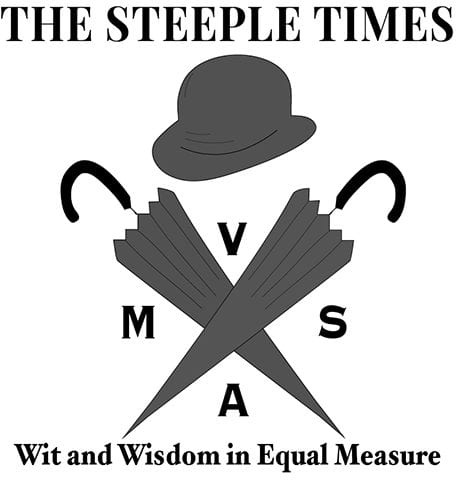New contributor Francis Megahy shares his views on English people speaking American
Can you remember when the place where you caught a train was called a “railway station”? The only exception was in American movies, where it was quaintly known as a “train station”. Well, at some time in the past twenty years, people in the UK started using the American version and I don’t know why.

The same goes for the expression used to terminate someone’s employment. People used to “get the sack”. Now they’re “let go”, clearly a self-serving distortion of the actual meaning of the words. “We had to let Jackson go” implies that Jackson was desperate to leave the job and his employer was reluctantly forced to accede to his wishes; when the truth is that there was a corporate merger and, oh dear, here comes another Americanism – “Jackson was downsized”. Jackson’s stature of course remained the same. In reality, what is meant is: “We just didn’t need Jackson any longer”.
While we’re on “need”, that’s a word routinely misused in the US, and that misuse is being copied in England. Instead of saying, “John, call Smith, please”, people are beginning to adopt the American: “I need you to call Smith”. More offensive is using it as an instruction: “You need to call Smith”. In fact, you don’t need to call Smith at all. This is merely a euphemistic way of trying to turn my instruction into your necessity.
It infuriates me when American usage reverses the meaning a word has always had in English. A good example is “oversight”. An oversight used to mean “something that had been missed, overlooked or forgotten”. In contrast, in the US, Congressional Committees have always been described as “oversight committees”, which doesn’t mean that all they do is look into mistakes.
Sadly, “oversight” has become a “buzzword” for the Cameron government, replacing the use of perfectly good English words like “monitoring” or “supervision”. I find it equally maddening when the adoption is of redundant expressions. Another Cameron government favourite currently is the meaningless “going forward”, which should be replaced either by “in the future” or more frequently deleted entirely. It’s a classic example of Orwellian newspeak, a spurious suggestion that we are making progress. “Going forward”, please avoid saying “going forward”.
I think that much of this happens because of the importation of US TV shows, so that copying the US usage is seen to be “hip” (that used to be the English “trendy”). For some unaccountable reason, it’s hipper to say that Selfridges (which used to be “in” Oxford Street) is “on” Oxford Street.
Then there’s mispronunciation. An early and irritating example of this derived from the Black Power movement in the US in the 1960’s and it is the word “harassed”. In Britain, it always used to be pronounced with equal emphasis on both syllables. But in the 60’s Americans began pronouncing it with the emphasis on the second syllable: “h’rassed”. Now in England the police (sorry, “the cops”) are always “h’rassing” somebody.
Another unpleasant mispronunciation which is insidiously spreading is “schedule” as “schedule”. Sports commentators, notoriously sloppy in their use of language, have begun to import a very weird American usage: Andy Murray’s mother is no longer “watching” the match, she is “watching on”. And, of course, the English word “leverage” [with a long first ‘e’] is now routinely mispronounced as “levverage”.
Ignorance plays a large part in all this. In the US people have for several decades not been educated well enough to know that the word “unique” means “singular, one-of-a-kind”. Now English people also, in their feeble attempts to add emphasis, will call something “very unique”. Something is “unique” or “it is not”: There can be no degrees of uniqueness. Nothing is ever “very unique”.
I recently encountered a young Englishman in La Brasserie [“on” the Fulham Road] who wielded an entire vocabulary of American misusage and mispronunciation. So subtly has this verbal misbehavior crept upon us that he was totally unaware that he was mangling English until I pointed it out. He then became defensive, saying that he was no fan of America and this was just a “modern way of speaking”.
His ignorance was laughable and I was forced to draw to his attention to the fact that he was wearing sneakers, a T-shirt, jeans, a US football jacket, a baseball cap and had just parked a Jeep Cherokee. He wasn’t even getting any fun out of speaking the way he did and I found his lack of awareness of the American origins of his clothing and his careless adoption of Americanisms extremely depressing. Truly a “dumb” [“dim”] kid. I had to let him go.
The encroachment of Americanisms on English seems so continuous and irresistible that can the day be far away, “going forward”, when we have to ask: “Where is the “Rest Room”? I’m going to subject that tendency to meticulous oversight.
Los Angeles based Francis Megahy is a documentary maker and author. Follow him on Twitter at @FrancisMegahy.
Subscribe to our free once daily email newsletter here:








The Scots struggle to speak it, and had to put desperate compensatory measures in place to have some understanding of financial markets and international trade regulation, Scotland appointed Donald Trump as their chief interpreter, so that they don’t get lost.
The erosion of the English language and the hideous Americanisation of it is a subject that I cover in my book Union Jack. In the book, my hero Jack Nelson being a dictator solves the problem by replacing all primary school teachers with highly educated Irish ones because the Irish posses the most extensive vocabulary of all English speaking races. I also cover the matter of the casual use of four letter words to punctuate almost every sentence nowadays, in particular the unnecessary and totally inappropriate use of the words fu+k and sh+t which find their way into everyday conversation. There is no doubt that Hollywood has much to answer for, the main characters in virtually all films now use these words continuously in every script. The lamentable situation has also been re-enforced by our own reality TV shows which only feature morons who are incapable of completing a single sentence without including either or both of these two swear words as a form of emphasis.
The rain in Spain stays mainly in the plane, America’s abuse of the English language is due to the Spanish influence. The NHS and Prison Services and Social Services pay millions of Pounds a yearof tax payers money to Big Word to interpret foreign languages of clients many illegals into English. The cost of political correctness and they still get lost in translation. Hollywood films use of words such as shit and fu.k costs the taxpayers nothing. English has become a bloody expensive hobby in the UK for the taxpayer.